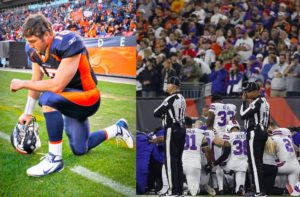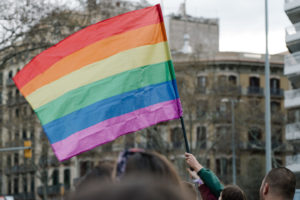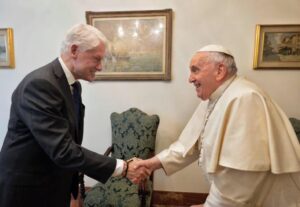Australian law forbids prayers, revealing the religious freedom threat of bans on ‘conversion therapy’
(The Daily Signal) – Imagine the government told you what you can and cannot pray for, inside your own head.
Such an idea seems better suited to “thoughtcrime” dystopias—such as…

(The Daily Signal) – Imagine the government told you what you can and cannot pray for, inside your own head.
Such an idea seems better suited to “thoughtcrime” dystopias—such as George Orwell’s “1984” or Aldous Huxley’s “Brave New World,” where the government attempts to control your every thought—rather than to the modern, free English-speaking world.
Yet a government in the Australian state of Victoria has trodden on the sacred space of one’s own inner prayers, all in the name of protecting people who identify as LGBTQ.
The Change or Suppression (Conversion) Practices Prohibition Act 2021, which went into effect in August 2022, forbids certain practices aimed at changing or suppressing an individual’s gender identity or sexual orientation. The law also bans “carrying out a religious practice, including but not limited to, a prayer-based practice, a deliverance practice or an exorcism.”
The Victorian Equal Opportunity and Human Rights Commission lays out “prayer practices” that fall under the ban, “with or without a LGBT person.”
According to the commission, “prayers that are directed at a person to change or suppress their sexual orientation or gender identity cause harm and are prohibited.” Forbidden prayers include petitions to God that “ask for healing; ask for a person to change; ask for a person not to act on their attractions; talk about a person’s brokenness or need to repent; [and] ask for long-term celibacy.”
The commission presents other ways that Victoria residents can “continue practicing your faith without causing harm.” It suggests petitions to God that ask “for guidance; that are supporting and reassuring that the person is created in their God’s image and perfect the way they are; that acknowledge their God loves the individual.”
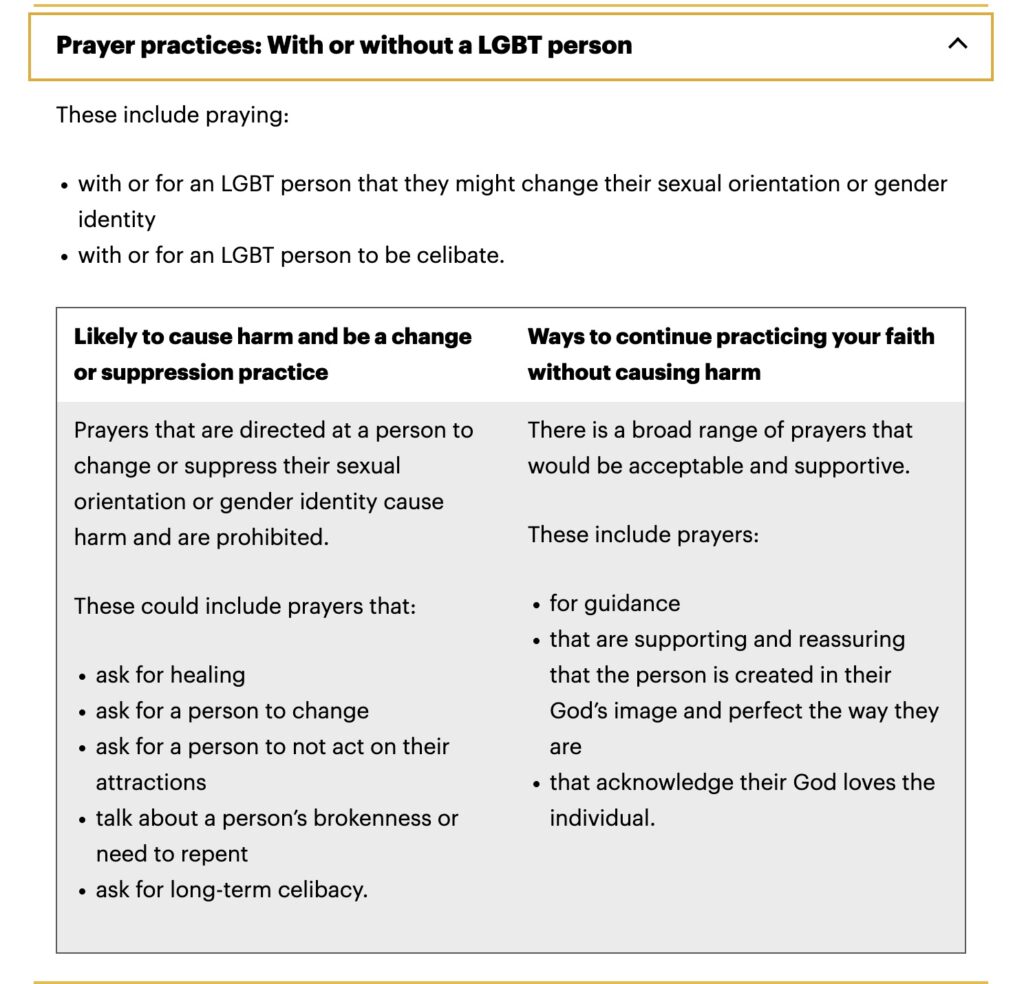
The commission seems oblivious to the fact that some of these condemnations and “suggestions” amount to theological claims that arguably violate orthodox Christian doctrine. Christianity teaches that all have sinned and fallen short of the glory of God (Romans 3:23), and Jesus repeatedly called on his audience to “repent and believe the Gospel” (Mark 1:15).
The Apostle Paul would vehemently contest the idea that people are “perfect the way they are,” as he taught that people are dead in their sins until God saves them (Ephesians 2:1-10).
If calls for repentance violate the law, then Christianity itself has been made illegal in the state of Victoria, home to roughly 7 million Australians.
The law does not ban all calls for repentance, however; only those particularly aimed at people who identify as LGBTQ. The commission explains that “everyday religious activities will only be considered illegal when they meet the act’s definition of a change or suppression practice.”
To violate the law, such practices must be directed at an individual because of his or her sexual orientation or gender identity, and undertaken with the intention to change or induce that person to change or suppress his or her sexual orientation or gender identity. The commission insists that criminal penalties only apply to situations where “injury resulting from the practice is able to be proven, and where there is proof of criminal negligence.”
“This law is not about stopping people from practicing or enjoying their faith, it is about preventing harm—and these practices are harmful,” the commission claims.
According to the commission, a pastor or priest would violate the law if he encourages a person to remain celibate if that person confesses that he or she struggles with same-sex attraction. The pastor would not violate the law if he merely told the person that the Bible “considers such feelings to be sinful, but does so only to convey the text’s teachings and not to change or suppress the person’s sexual orientation or gender identity.”
Who determines whether such a lesson was intended to “convey the text’s teachings” or “to change or suppress” sexual orientation?
The law creates a civil response process by which “survivors” report alleged violations to the commission, which then launches investigations. It seems the very same body that is oblivious to the centrality of repentance in Christianity would decide whether a pastor had violated the law by preaching the plain meaning of Scripture.
The commission claims the law does not “interfere with your right to have or adopt a religion or belief,” but it “places some limitations on the right to demonstrate your religion or belief in order to protect others.”
Under the Charter of Human Rights and Responsibilities Act 2006, the commission explains, the right to freedom of thought, conscience, religion, and belief “may be limited in certain circumstances.” When Parliament passed the ban on “change or suppression practices,” the legislature “considered the impact that the act might have on human rights and concluded that it was necessary to limit the right to freedom of religion … to reduce the harm these practices cause.”
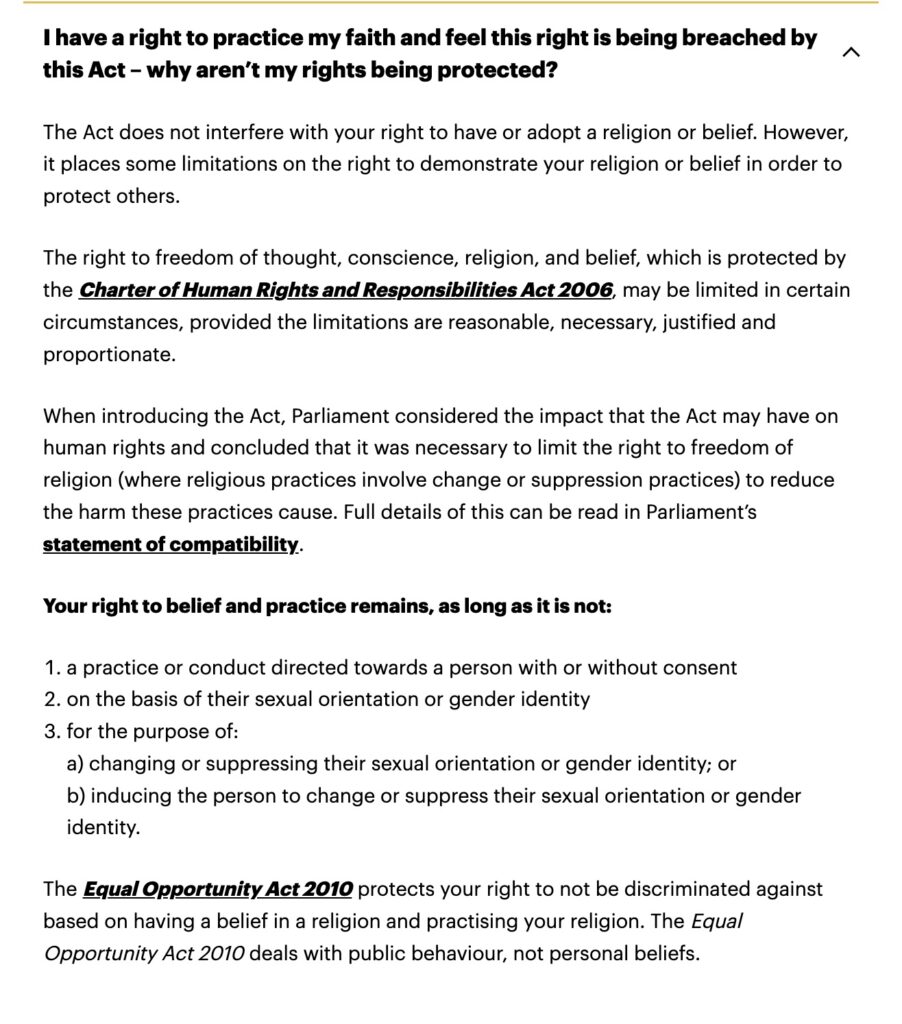
Many doctors have warned against the “affirmation” of a gender identity different from a person’s biological sex, even as medical organizations have embraced experimental treatments often euphemistically referred to as “gender-affirming care.”
Dr. Stephen B. Levine, a psychiatrist and early proponent of transgender medical interventions, later warned against transgender interventions for children. He wrote that “there is no consensus or agreed ‘standard of care’ concerning therapeutic approaches to child or adolescent gender dysphoria” (the condition of identifying with a gender different from a person’s biological sex). He also warned that social transition—the public “affirmation” of a person’s “gender identity”—”is a powerful psychotherapeutic intervention that radically changes outcomes” and makes it far less likely that young children will “desist” from a transgender identity.
Yet, under this Australia law, therapy can only go in one direction—encouraging a person’s “gender identity.” The commission explains that even if someone wants to change or suppress his or her sexual orientation or gender identity, such requested efforts would still violate the law.
“There is no scientific evidence that sexual orientation or gender identity can be changed or suppressed,” the commission states, with the full assurance of its own kind of faith. “Any activity to encourage this person to change or suppress their sexual orientation or gender identity will cause harm and is likely to be a change or suppression practice,” and thereby illegal (emphasis in original).
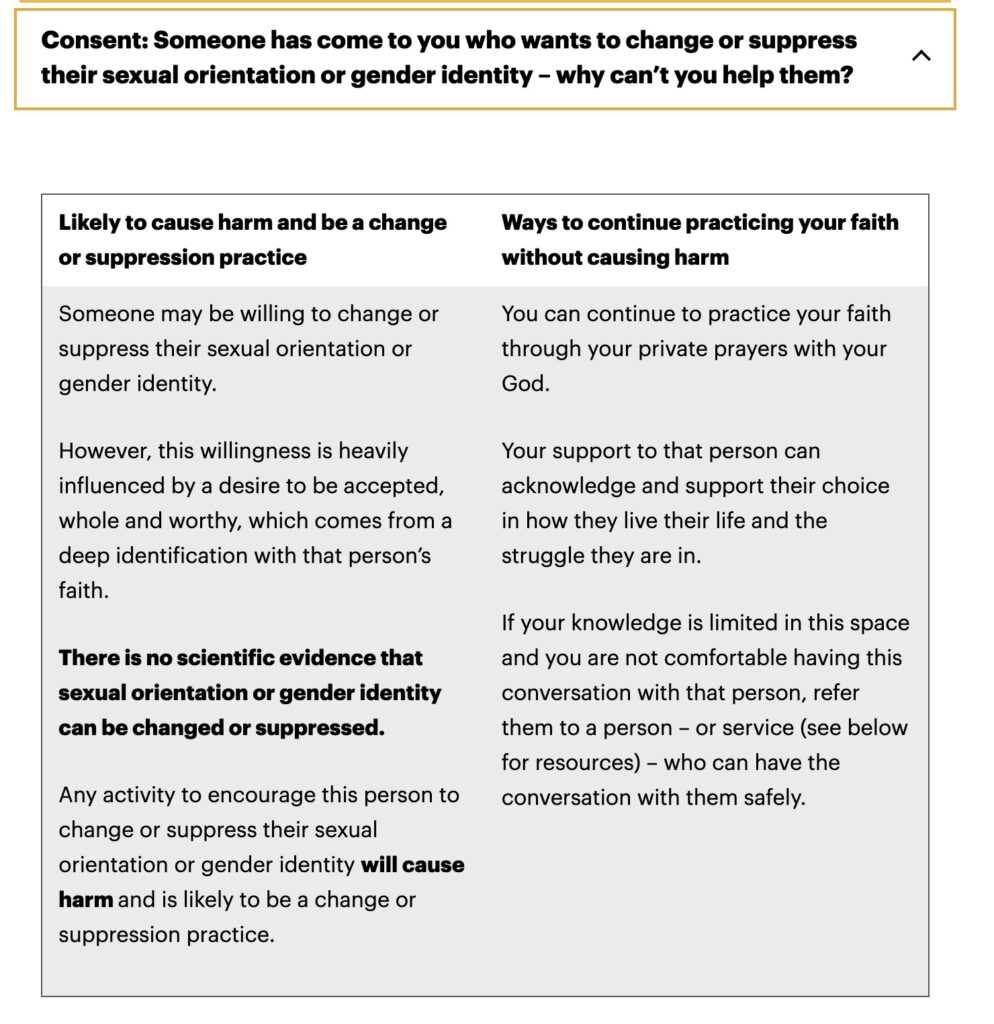
While neurologists and psychotherapists once employed horrific methods, such as lobotomies and electroshock “treatment,” to try to force people with same-sex attraction to become straight, these kinds of “conversion therapy” have rightly been condemned. Therapists today offer patient-driven talk therapy, which states such as Victoria outlaw.
Contrary to the commission’s statement about a lack of evidence that gender identity can be changed, many people who formerly identified as transgender have grown to reject that identity and warn against gender ideology. Detransitioners, such as Chloe Cole and Walt Heyer, underwent medical “treatments” to “affirm” a gender identity they later claimed had always been false. Heyer says talk therapy helped him address the underlying psychological issues behind his transition.
Victoria can only make its claim by dismissing people who wish to reject LGBTQ identities as heretics and striking them from the record as if they were never LGBTQ to begin with.
At least one recent study has suggested that the scientific evidence allegedly undermining sexual orientation change efforts actually shows that LGBT people who undergo non-“affirming” therapy actually have lower rates of suicide. Many studies that supposedly demonstrate the harms of patient-driven talk therapy to counter unwanted same-sex attraction and gender dysphoria arguably suffer from bias, as researchers discount the stories of people who later rejected an LGBTQ identity, and who are not included in such studies.
Worse, pro-transgender “health” organizations have claimed that even a strategy of “watchful waiting” for children who say they identify with the gender opposite their biological sex “has caused enormous harm to the transgender and gender diverse community and is tantamount to ‘conversion’ … therapy under another name.”
It seems that the transgender movement aims to demonize any attempt to delay experimental medical interventions on children using the “conversion therapy” label.
Victoria’s law condemning certain forms of prayer seems beyond the pale for Americans, but 27 states, along with Washington, D.C., and one U.S. territory have laws banning “conversion therapy” for minors, according to the pro-LGBTQ Movement Advancement Project.
These laws only allow therapy in one direction; namely, for an LGBTQ identity—even if a patient expresses a desire to overcome unwanted feelings of same-sex attraction or gender dysphoria.
If states insert themselves into the therapist-patient relationship by outlawing mainstream patient-directed talk therapy for patients who do not embrace their same-sex attraction or gender dysphoria, how long before they outlaw pastors praying for those struggling individuals in public settings?
Victoria did not respond to questions about how broadly it aims to execute the statute and whether it has prosecuted any pastors for such prayers.
This law, like others similar to it in the U.S., requires a certain kind of unshakeable faith; specifically, in the immutability of LGBTQ identities and the ultimate evil of any attempt to address unwanted same-sex attraction or gender dysphoria, regardless of a patient’s consent.
Of course one of those laws would ban orthodox Christian prayer. The entire point is to establish a competing religion.

